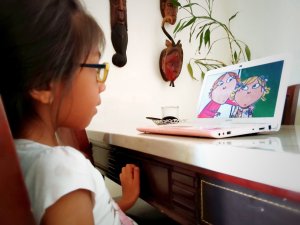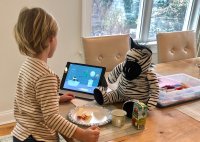Apps for Students With Special Needs—As School Buildings Shutter
The coronavirus creates a unique challenge for students with special needs—educators share recommendations for apps to support learning at home.
Special education is facing severe challenges as remote becomes the new norm for K–12 learning during the coronavirus pandemic. Delivering differentiated content in a well-equipped classroom can be difficult on a good day, but now that most schools are closed or closing, educators who work with children with special needs must, in many ways, completely reinvent their approach to teaching.
One of the main concerns for both teachers and parents is keeping students on track to reach their individualized education program (IEP) goals and objectives as they are tailored for each student. Teachers must also work much more closely now with parents/caregivers to support this learning at home. In some cases, students are accustomed to having aides, in addition to teachers, in the classroom. It is a lot of responsibility for caregivers to bear, but luckily some of the digital tools now available can really help.
I reached out to my special education colleagues via the Facebook Group called Education App Talk (E.A.T.), asking for their favorite digital tools; what follows includes some of their recommendations, but it is just the tip of the iceberg of what is available. Remember, as with any tool, what may work wonders for some students will only frustrate others. Customization is key with any app, so adults and educators should be prepared to put in some time learning the apps themselves or how to make modifications in the settings. Many apps come with great teacher-made materials; look for video tutorials, lesson plans, and extension activities.
Free Apps or Apps With a Free Trial
My PlayHome is a free app that gives kids a digital doll family of up to 15 people in various skin tones with whom they can explore, play, and share stories with other people. These shared stories help to increase student verbalizations, provide a place for social and emotional learning, and teach necessary early language skills.
SoundingBoard is a free mobile augmentative and alternative communication (AAC) app designed for children who are unable to speak (or who have limited speech) to help them communicate. In order to meet the needs of this particular population, the app comes with preloaded boards using symbols with recorded messages. Students select and press images on the board to prompt a verbal message.
LetterSchool promotes early literacy and numeracy skills by guiding children to tap, touch, and trace colorful animations. Children learn letter formation, letter sounds and names, spelling, counting, and other preschool and primary skills. This app, which offers a free trial, also does an excellent job of developing fine motor skills and eye-hand coordination.
Tales2Go, an audiobook service that offers a free one-month trial, helps students who struggle to read while boosting their listening skills. This app has an extensive collection of stories and books for all ages, with scores of splendid narrators who bring stories from every genre to life.
Epic! is an e-library that is great for supporting reluctant or struggling readers. It provides access to more than 20,000 high-quality children’s books and educational videos and includes an assortment of both fiction and nonfiction books from prominent publishers. Epic is offering free access to schools during this time.
Paid Apps
Busy Shapes, by Edoki Academy, is based on Piaget’s research on cognitive development, and it begins with cause-and-effect play that evolves into an exercise in problem-solving and tool use. The game also helps children improve their fine motor skills through a series of puzzles in an exploratory and evolving playground.
Edoki Academy also offers a series of math apps using a step-by-step approach whereby students learn Montessori math by manipulating various objects that appear on the screen. It also helps boost motor skill development.
Math Drills is a skill-based math drills app that students tend to love, as they can compete against themselves to increase their speed and accuracy. It includes basic math operations like addition, subtraction, multiplication, and division, and also features advanced options in the settings so that teachers and students can create personalized environments, and track scores and test history.

Phonics Genius provides a simple way for children to learn how to recognize, read, and speak words through letter sounds. The app contains more than 6,000 words, compiled by phonetic groups, in addition to the fun games for practicing skills.
SentenceBuilder is a conversation simulator designed to help elementary-aged children learn how to have conversations with their peers in a variety of social settings, which can be a particular challenge for special needs students. ConversationBuilderTeen, for older students, is geared to help kids learn when it is appropriate to introduce themselves, ask questions, and change the subject of the conversation. This app also covers sarcasm and addresses how kids should respond to bullying.
Word Wizard has a talking alphabet that allows kids to experiment with phonemic awareness and word building. The verbal feedback helps teach children in a nonthreatening way, as the voice reads any words the child creates—allowing for self-correction. The app also supports letter recognition, phonological awareness, and spelling, and comes with 184 built-in word lists such as the 1,000 most frequently used sight words. It even keeps tabs on children’s progress with detailed monitoring and has an extensive teacher activity guide.
The Anti-Coloring Book App series is my personal favorite resource of all time and is now available in app form. This suite of online books uses the space at the bottom of the page for a question and the child draws the answer. These are open-ended questions—with no right or wrong answers—that promote a child’s critical thinking skills, foster creativity, and encourage risk-taking and problem-solving.
Digital Modifications
Aside from apps, digital modifications are critical for online home learning for special needs students. Text to speech (TTS) is a type of assistive technology that reads digital text aloud and works with almost all digital devices—phone, iPad, computer. Many types of text files and most web pages can be converted into audio with TTS software.
- Mac/iPad—in Settings under Accessibility
- Windows—in Control Panel under Ease of Access
- Android—in Settings > Accessibility > Text to Speech Output
- Chromebook – in Settings under Accessibility
Speech recognition (dictation) is another necessary tool, found on most digital devices, that enables students to express themselves by simply talking without having to worry about typing, spelling, and grammar. Dictation software is available on most devices in the settings menu, and it helps students expand their writing skills and achieve new levels of success. Note: Apple has a more advanced speech recognition system than Windows.
During the coronavirus pandemic, out-of-school learning is a great challenge, but it is particularly so for special needs students, who already face hurdles in their schooling. Be mindful—and patient—with special needs students as they try to adapt to this new dynamic. Change alone can be very disruptive for many children, and they will need time to adjust to their new routine. Don’t be surprised by regression in social and emotional behaviors. Small strategies like breathing exercises, creating structure, and helping students methodically work through problems are essential at this time.
